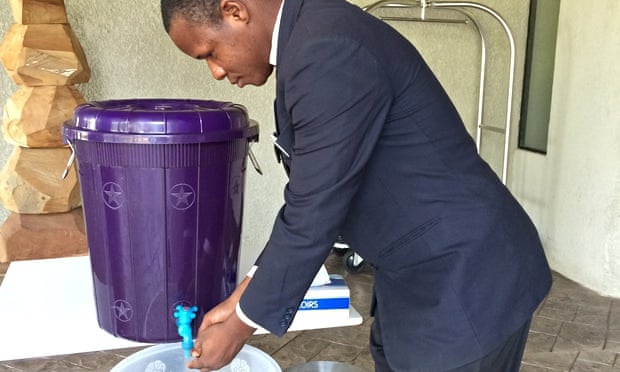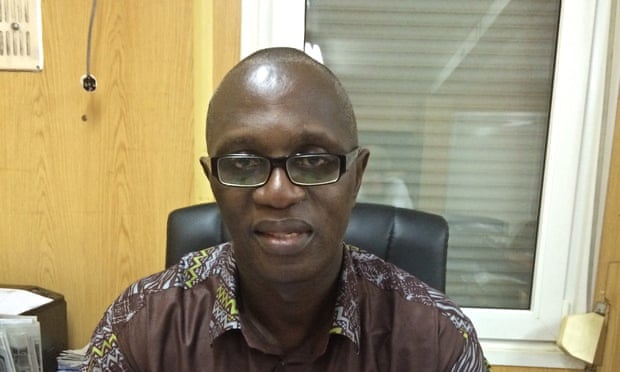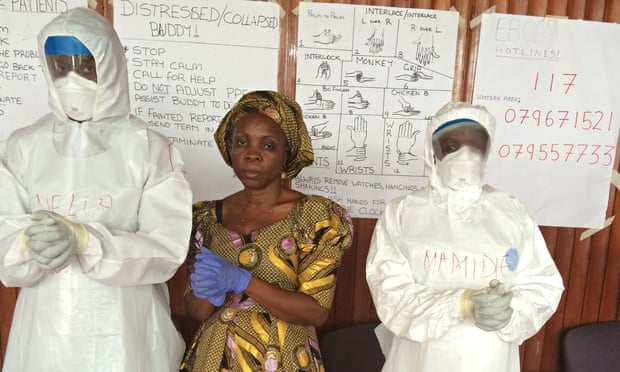Ebola diary: tackling the virus in Sierra Leone day-by-day
The Guardian’s health editor, Sarah Boseley, is travelling in west Africa, looking at the impact of the Ebola epidemic and the reasons why it has taken off in the region with such devastating effect and continues to surge in Sierra Leone
A healthcare worker prepares to enter an Ebola treatment centre west of Sierra Leone’s capital, Freetown.
Photograph: Michael Duff/AP
Photograph: Michael Duff/AP
Freetown, Sierra Leone, doesn’t look like a city overtaken by a terrifying and deadly epidemic. Straight-backed women carry goods to trade on their heads as they have always done, children shout with laughter under a water tap, men talk on street corners and motorcycles with paying pillion passengers weave between the honking cars. Life goes on because it must. Bodies are no longer left lying in the streets by their terrified families. And yet nobody here can forget or ignore the escalating numbers of Ebola cases in Sierra Leone, where the epidemic, apparently in check in Liberia and Guinea, is out of control in Freetown’s western areas and Port Loko to the north.
We all have hands that smell like a swimming pool. Every time you enter a building, you must wash them under a tap of chlorinated water. Then a man steps forward with a gun-like thermometer and aims it politely at your forehead. It bleeps. I must have had my temperature taken eight or more times today and it has varied from 35 to 36.6. That’s in the normal range, but should it go to 37.5 you may be whisked off to a holding centre as a suspect Ebola case, where – even if your fever is flu or more likely here, malaria – you will be detained with people who really do have this dangerously contagious virus. I was so nervous the first few times that I illogically persuaded myself my temperature was going to shoot up from the stress. Of course, it can’t. And now I’m as blasé about it as everybody else. We all smile, wash our hands, face the gun and carry on.

In large letters on a hoarding at a traffic junction is a public health warning. It runs:
Ebola is realABC: avoid body contactNHS: no hand shake
Leaving aside the nod to the colonial past, the sign tells a sad story. Sierra Leoneans are being asked to make fundamental changes to their behaviour. It goes beyond funerals, where families now know – although they do not all accept – that they must not touch the body of those who have died. A hug or a handshake is now considered dangerous. That is hard in a tactile society.
The National Ebola Response Centre (Nerc) has moved into the empty buildings of the UN special courts set up to try war crimes in 2004. There are still cells for the accused and the courtroom, now full of people with phones and laptops, has bulletproof glass in front of the benches where the families used to sit and watch the prosecutions.
Palo Conteh – to give him his full name, Major (Retired) Alfred Palo Conteh – the minister of defence, is in charge. Among his other achievements, he is a barrister, called to the bar in the UK, and Sierra Leone’s record holder for the 400m.

Getting more treatment beds is very important, says Conteh, but to bring the epidemic to a close, “has to be tied in with social mobilisation, getting our people to behave the way the medical experts are asking them to do. That is if somebody is ill in the household, call the emergency number 117 and report it. If somebody dies, don’t touch that corpse. Call 117 so that the burial teams will come. If people adhere to these messages then the figures will just plummet.”
Initially, he says, there was denial that Ebola existed. Now even two-year-olds know.
But how do you change people’s behaviour? From HIV to obesity, it’s one of the hardest things to try to do in public health. When he was appointed to head the response, Conteh said, they called a meeting of religious leaders.
Families can get a coffin and a pastor or an imam to say prayers and up to 10 family members can watch from a safe distance. People in the main have accepted it and the authorities report a 95% safe burial rate, but there are those who call 117 to get the teams out – once they have washed the corpse.“We sat round the table and said: ‘For centuries, we have been doing this – when grandma dies, you kiss the corpse, you hold her and you wail and all that, but now, we cannot.’ So we asked them to go back to their churches and mosques and tell people that from now, you have to give them a safe medical burial, but dignified.”
And recently the president decided it was time to get tough. For the last four weeks he has been visiting chiefs, local leaders and traditional healers in districts around the country. “He puts it bluntly. If I come again in 21 days and your figures are high, you have to explain why. It means you haven’t engaged your people,” says Conteh.
People realised he meant it when the president sacked his own uncle, who was one of the section chiefs in the Bomboli district.
Heading the UK task force is Donal Brown of the Department for International Development. Like Conteh, he is upbeat about the epidemic. It’s now localised, he says.
In the the east of the country, the numbers have dropped considerably. And within a month to six weeks, they will have enough treatment beds. Within the next two weeks, five more UK-funded treatment centres will come on line, he says, in addition to the one at Kerry Town which has already opened and is being run by Save the Children. Other centres are opening too.
“We will have enough beds by the end of December, beginning of January,” he says.
“We would all have loved to have done it faster, but as someone said to me the other day, from the UK’s perspective we built six 100-bed hospitals in the African bush in two to three months and fully equipped them and staffed them.
“That is an enormous project. That would have taken us in the UK five years to do.” He says we’re not on the endgame, however, but at the base camp of Everest.
All these treatment centres need a lot of staff. At the football stadium, hundreds of Sierra Leonean doctors, nurses, pharmacists, teachers, students and even a footballer are being trained in using PPE (personal protective equipment]. The medically qualified will treat patients.
The others are “hygienists” – a diplomatic term for the incredibly important people who do the unpleasant job of cleaning up highly infectious vomit and chlorinate everything inside the treatment unit “red zones”.
The British army has been organising the training but has just handed over to the IOM (International Organisation for Migration). I watch as Matron Safula Mansaray instructs the white suit-clad recruits in the “Ebola pose”.
Unless they are actually treating the patient, they must keep their hands clasped in front of them to prevent them absent-mindedly rubbing their face the entire time they are in the “red zone” with patients. She is more terrifying than a British sergeant-major on the parade ground. The hot and uncomfortable trainees do as they are told.

One of the nurses is Adiatu Pugh, 38, an Ebola survivor. She got ill in September and when her fever and joint pains turned to vomiting she realised it was Ebola. She cleaned the bathroom with disinfectant before calling an ambulance so that her husband and son would not be at risk. She was in a holding centre with both men and women until she got the diagnosis. “I felt very bad. When they told me it was Ebola, I thought it was the end of me. I started crying. All you think about is death, just death when you wake up in the morning.”
She is now learning to put on the protective suits that distressed her when she was ill. “It was terrible. You don’t see people by their eyes. You see a cave with a hole.”
She recovered thanks to god’s grace and good treatment at the government Hastings hospital, she said, but to her great sadness, her nine-year-old son, Clifford, will not come near her for fear. When I ask her why she wants to nurse Ebola patients, she says: “There are so many children. I will hold them and reassure them that they are safe.”
Source: http://www.theguardian.com/world/2014/dec/08/-sp-ebola-diary-virus-sierra-leone



No comments:
Post a Comment